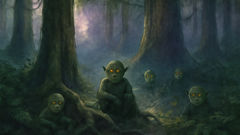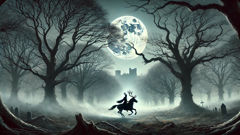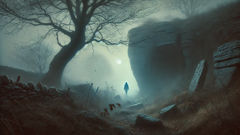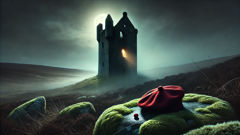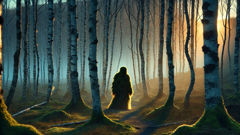Introduction
In the deepest heart of Central Africa, where the Congo River meanders in great, lazy arcs beneath ancient trees, the forest breathes secrets older than any village or tribe. The air is thick—rich with green scents, heavy with the memory of rain and the hum of unseen creatures. Shadows slip between trunks as thick as a man’s embrace, and sometimes, if you listen closely, you can hear the low, pulsing heartbeat of the world itself. This is a land ruled by the old ways, where every whisper in the night and every rustle in the underbrush might be something more than animal or wind. Among the people of the Congo, there persists a legend as enduring as the ceiba trees: the tale of the Eloko. These are not spirits conjured by idle fears; they are the soul of the forest’s rage and protection, as real as the drums that echo through the night. Eloko—singular and plural alike—are said to be dwarfish beings, neither living nor fully dead, with skin as green as young leaves and eyes as bright as dew in the morning sun. They haunt the oldest groves, their teeth sharp and their voices cold as river stones. Hunters speak of them in hushed voices around campfires, warning that greed or disrespect for the forest’s laws can summon their wrath. But it is not just fear that binds the people to these tales—it is respect, and a deep, abiding sense that the world is wider and stranger than any one life can hold. To understand the Eloko is to understand the Congo itself: beautiful, unfathomable, and dangerous to those who tread carelessly. The legend of the Eloko is more than a story. It is a warning, a song, and a map to places few dare to walk. And among all who heard their name whispered on the wind, there was one young man—Bemba—whose destiny would take him beyond the edge of the known world, into the green and haunted silence where the Eloko waited.
Into the Forest’s Heart: Bemba’s Journey Begins
Bemba had grown up on the edge of the forest, in a village where stories were as much a part of daily life as the pounding of fufu or the laughter of children. His grandmother, Maman Tumba, was the keeper of tales. Each night, as fireflies blinked above the huts and the river sang its endless song, she would gather the children and weave words into magic. The tale of the Eloko was her favorite, and Bemba had heard it so many times he could almost see the creatures in his dreams: green, wild, and cunning, with bells that could lure a man to his doom.
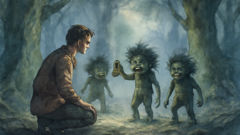
Yet, for all his grandmother’s warnings, Bemba was restless. He was seventeen—strong, clever, and hungry to prove himself. The forest called to him in a way it never had to others. It wasn’t just the promise of game or rare roots; it was the mystery. When his father died from a snakebite on a hunting trip, Bemba felt the loss not only as grief but as an open wound—a call to step into the forest himself and lay his fears to rest.
One dawn, while the world was still cool and pale, Bemba packed his spear, a woven satchel of smoked fish, and his father’s old charm—a gnarled bit of bone wrapped in red cloth. He told no one but Maman Tumba, who clasped his hands and pressed her lips to his forehead. “Respect the old ways,” she whispered, “and do not follow any song you hear that is not your own.”
The forest welcomed him with a hush. Shafts of gold filtered through the leaves, and everywhere Bemba looked, life thrummed—parrots in riotous colors shrieking overhead, monkeys leaping from branch to branch, the deep croak of hidden frogs. The further he walked, the less familiar the forest became. Vines as thick as rope hung from trees, and flowers opened wide, heavy with nectar and mystery. Bemba remembered every lesson his father taught him: never turn your back on a game trail, never eat a fruit you do not know, and never, ever stray after dark.
By midday, Bemba had reached the edge of a grove his people called nkisa—the forbidden place. Here, the trees grew so close together that hardly any light touched the ground. The air was cooler, damper, and filled with the scent of earth and something sharp, like metal. It was said this was where the Eloko lived, and that those who entered uninvited would be lost forever. Bemba hesitated, heart pounding. Yet the memory of his father—brave, laughing, unafraid—pushed him forward. He stepped into the shadow, and the world changed.
Inside nkisa, time unraveled. The birds fell silent, and even the insects seemed to hold their breath. Bemba moved slowly, each step deliberate. The ground was soft beneath his feet, carpeted with centuries of fallen leaves. Roots twisted like sleeping snakes, and in every hollow, it seemed, eyes watched. At first he thought it was only his imagination, but as he pressed on, he saw flashes of green: a hand here, a foot there, gone as soon as he turned his head. The Eloko were real. He could feel them, ancient and patient, waiting for him to falter.
His breath fogged in the cool air. He reached for his charm, muttering a prayer. Suddenly, a sound—soft, sweet, almost human—floated on the air. It was a song, high and bright, threaded with bells. Bemba’s heart hammered in his chest. He remembered Maman Tumba’s warning: Do not follow any song you hear that is not your own. Yet the melody was irresistible. It pulled at something deep inside him—a longing for belonging, for knowledge, for home.
He pressed forward, deeper and deeper, until he saw them: three Eloko, no taller than his waist, with emerald skin and wild hair tangled with roots and beetles. Their teeth were long and sharp, their fingers tipped with claws. One shook a tiny bell, its sound piercing and clear. The song grew louder, the forest spinning around him. Bemba stumbled, dropping to his knees. He clutched his charm and forced himself to remember his grandmother’s stories. The Eloko watched him with blank, ancient eyes. The leader stepped forward, baring its teeth in a grin both friendly and terrifying.
“You have come where you should not walk,” it rasped. “Why do you seek us?”
Bemba’s voice was small but steady. “I seek to understand, not to harm. My father died here. I wish to know why the forest took him.”
The Eloko considered this. At last, it nodded. “Then you must prove your respect. Stay until the moon rises. Do not eat, do not drink, do not sing. If you endure, we will answer.”
The test began. As the sun slid behind the trees, Bemba sat in silence. He watched as the Eloko danced in circles, their bells ringing, their laughter sharp as thorns. Hunger gnawed at him, thirst burned in his throat, and every muscle ached from stillness. But he did not move. When at last the moon crested the treetops, the leader beckoned him forward.
“You have honored our ways,” it said. “Your father was brave, but he took without asking. The forest is not a gift—it is a trust. Remember this.”
With that, the Eloko vanished, melting into mist and shadow. Bemba found himself alone, but changed. He walked home beneath the moon, his steps lighter, the old charm warm in his hand. He carried with him not only answers, but a promise: to honor the forest, and the mysteries that dwell within.
Secrets of the Eloko: Trials in the Moonlit Wild
The days after Bemba’s return blurred with questions. In the village, some doubted his tale, whispering that he’d only dreamed or imagined what he saw. Yet others noticed changes—a new gravity in his eyes, a hush in his step as if he carried the silence of nkisa within him. Maman Tumba listened in silence when he recounted every moment, every word spoken by the Eloko. When he finished, she touched his cheek and smiled. “Few meet them and return. Fewer still are granted mercy. The forest has chosen you.”
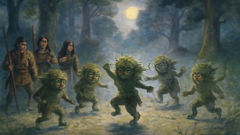
But with honor came responsibility. That dry season, the river shrank to a trickle, and game grew scarce. The elders debated sending hunters deeper into forbidden lands, but Bemba spoke against it. “If we take without respect, the Eloko will punish us.” His warnings were met with impatience by some, but he held firm. One evening, as the sun sank in fire behind the trees, a group of young men—led by Nando, Bemba’s childhood rival—slipped away with bows and dogs. They laughed at talk of spirits, hungry for glory and desperate for food.
Night fell heavy and hot. Bemba lay awake, unease gnawing at him. He rose and slipped from his hut, guided only by moonlight and memory. The forest was restless, filled with the sharp scent of sap and the distant cries of animals. Bemba followed broken branches and trampled ferns until he reached a clearing where ancient trees arched like cathedral pillars. There, he found Nando’s party—silent, motionless, faces frozen in terror.
The Eloko had come.
Bemba saw them among the roots and shadows, five this time—dancing, ringing their tiny bells. Nando and the others could not move, their bodies locked by fear or magic. The Eloko circled them, singing a song that grew louder, sharper. It was a warning, but also a judgment. Bemba stepped forward, clutching his father’s charm. “Let them go,” he pleaded. “They are young. They do not know.”
The leader—a tall Eloko with moss draping its shoulders—tilted its head. “Why should we show mercy?”
Bemba fell to his knees. “Because I ask it. Because I promise to teach them respect. Because mercy is greater than vengeance.”
For a long moment, the clearing held its breath. Then, slowly, the Eloko ceased their dance. The bells faded. One by one, the hunters collapsed to the ground, free but exhausted. The Eloko melted into shadow once more.
Bemba helped Nando to his feet. The older boy’s eyes were wide with awe and fear. “You spoke to them,” he whispered. “You saved us.”
Word spread quickly through the village. From then on, Bemba was no longer a boy, but a bridge between his people and the forest. The elders listened to his counsel. Children gathered to hear his stories, and hunters left offerings at the edge of nkisa before venturing out. The river swelled again, and game returned.
Yet Bemba was restless. He knew that peace was fragile. One evening, Maman Tumba summoned him. “The Eloko gave you their trust,” she said. “But there are deeper secrets still. When you are ready, you must seek them—not with pride, but with humility.”
Months passed. Bemba watched over his people, but the call of nkisa never left him. Finally, at the first rains of the new season, he prepared again—this time with gifts: beads of bone, honey in a calabash, a song of gratitude taught by Maman Tumba herself. He entered the forbidden grove as before, but now with a heart full of wonder, not fear.
The Eloko were waiting. They led him deeper than ever—past fallen trees, over hidden streams, to a place where the ground glowed with faint blue light and old bones rested beneath mossy stones. Here, Bemba saw visions: stories of the first people, of ancestors who bargained with the spirits for rain and harvest, of a time when humans and Eloko lived in uneasy harmony.
“Why do you show me this?” Bemba asked.
The leader touched his forehead with a clawed finger. “Because you listen. Because you remember. Tell your people: the forest is alive, and every tree has a soul.”
Bemba returned home changed once more—not just a hunter or a bridge, but a storyteller whose words would shape generations.
Conclusion
The legend of the Eloko endures not only because it frightens but because it teaches. For those who dwell along the river and beneath the eternal green canopy of the Congo, it is a living reminder that nature cannot be tamed or taken for granted. Bemba’s story became part of village life, retold in the flicker of evening fires and the hush before dawn. The forest remained both threat and blessing—a place of abundance for those who honored its mysteries and a realm of peril for those who forgot respect. In time, Bemba grew old. Children came to sit at his feet, asking for tales of the green-skinned spirits and their tiny bells. He told them that every rustle in the leaves might be an Eloko watching—not to harm, but to remind them: Take only what you need. Leave offerings for what you take. Listen for songs that are not your own, and walk lightly on the earth. The Eloko, after all, are not only guardians of the forest but keepers of balance—the boundary between man and wild. And sometimes, as the moon rose above nkisa and shadows danced in the mist, those who listened with open hearts could still hear the faint, haunting jingle of bells—a promise that the old ways lived on.

